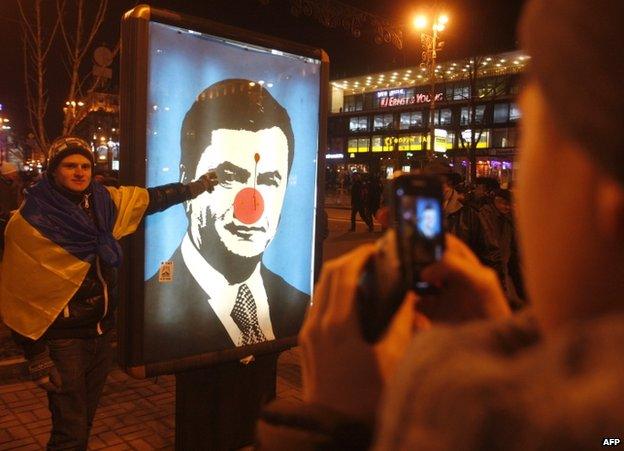Yanukovych tells West to keep out of Ukraine crisis
- Published

President Yanukovych, whose photo is seen here on a poster, has been condemned by the Ukrainian opposition
Ukraine's Russian-backed President, Viktor Yanukovych, has said he strongly opposes Western politicians intervening in the crisis in Ukraine.
He also suggested that Ukraine could adopt parts of Russia's recently founded Customs Union with other former Soviet republics.
The opposition is furious after he accepted a Russian bailout, seen as a reward for rejecting EU integration.
Russian President Vladimir Putin said he was defending the Russian economy.
"We just want to defend our gates," he told journalists in Moscow, days after Russia gave Ukraine a $15bn (£9.2bn; 10.9bn euros) bailout and gas discount.
Ukraine, he said, was a fraternal state with close industrial ties to Russia.
Protests have gripped much of Ukraine since President Yanukovych suspended the EU deal last month.
The opposition has been demanding to know what, if any, conditions the Kremlin attached to its decision to buy $15bn in Ukrainian government bonds and slash the gas price from more than $400 per 1,000 cubic metres to $268.5.
Russia's financial help averted a debt crisis for Ukraine in the short term.
'Observer status'
At a news conference in Kiev on Thursday, Mr Yanukovych was asked about visits to the pro-EU protest camp by foreign politicians who have included US Republican Senator John McCain, EU foreign policy chief Catherine Ashton, former German Foreign Minister Guido Westerwelle and others.
"I am categorically against anybody coming and teaching us how to live," he said.
"What is very important is that this is our internal matter, and that other countries do not intervene in our internal affairs."
He said the deal with Moscow did not run counter to Ukraine's course towards European integration and blamed Ukraine's current economic problems on the policies of his predecessors, the leaders of Ukraine's pro-Western Orange Revolution.
Asked why the Ukrainian economy was in such trouble, Mr Yanukovych said the gas contract signed with Russia by former Prime Minister Yulia Tymoshenko in 2009 had incurred a loss of $20bn.
Vladimir Putin: "We should support our sister nation in dire straits"
Another problem, he said, was the repayment of an IMF loan of $16.4bn negotiated in 2008, and a third factor was the recent fall in trade with Russia and other ex-Soviet states.
Asked about his position on the Customs Union, he said that Ukraine only had observer status but he suggested that it could adopt certain clauses.
"Ukraine's government is studying these clauses and, once conclusions are drawn, the corresponding transparent decisions will be taken on which clauses we will adhere to," he said.
Ukraine's pro-EU protesters have rejected any move to join the Customs Union, which was set up in 2010 and includes Russia, Belarus and Kazakhstan.
'Agricultural appendage'
"We always say seriously that Ukraine for us is a fraternal country," Mr Putin told a separate news conference in Moscow.
"And in a difficult situation, we are always ready to support a fraternal people. I assure you, that is the only objective reason [for the financial aid]."
"We cannot leave our economy unprotected if Ukraine joins the association [agreement]," Mr Putin said.
He gave as an example of close industrial relations the fact that "nearly 100%" of helicopter engines for Russia's armed forces were manufactured in Ukraine.
Ukraine, he argued, would not find a market for the engines elsewhere. The EU, he suggested, was only interested in Ukraine as an "agricultural appendage".